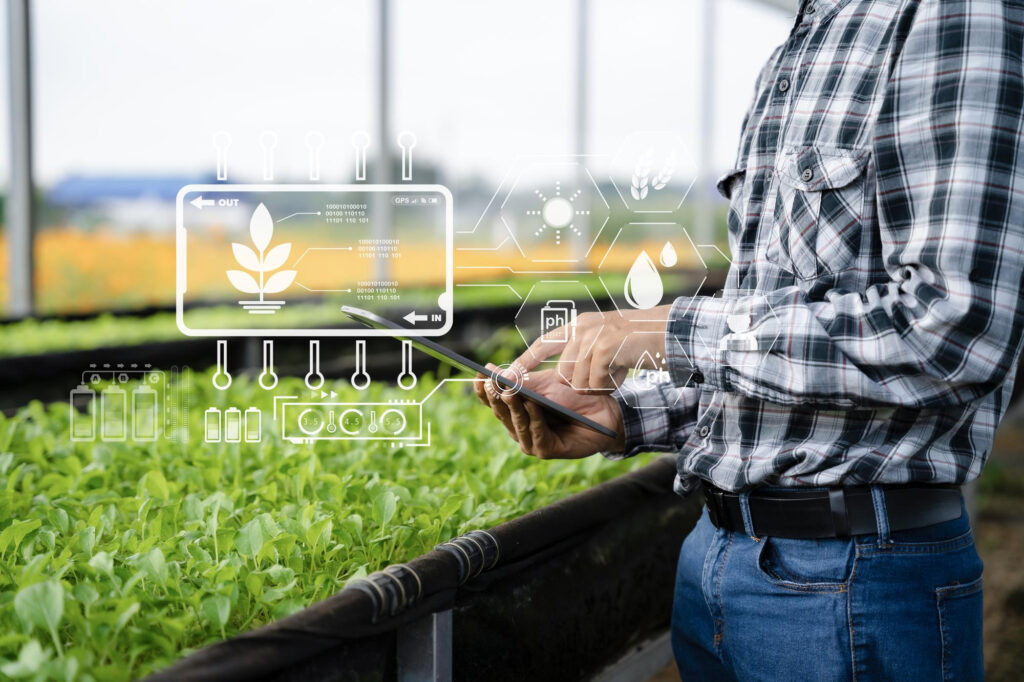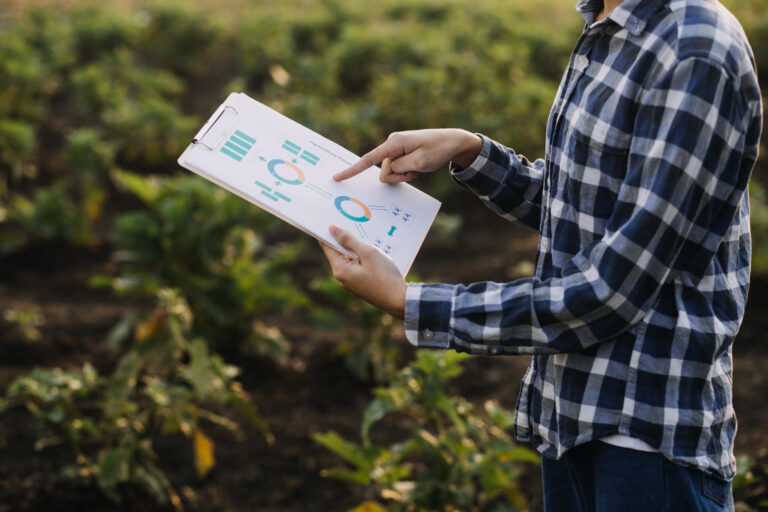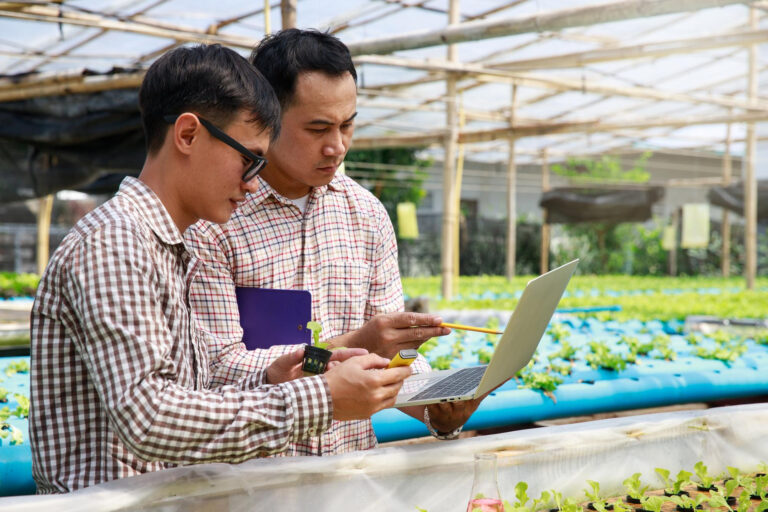How IoT and Odoo Agri Business & Plantation Solutions Transform Modern Agriculture

The agricultural industry is undergoing a technological transformation, driven by the integration of the Internet of Things (IoT) and Enterprise Resource Planning (ERP) systems like Odoo. Smart farming leverages real-time data collection and automation to optimize farm operations, improve efficiency, and enhance sustainability.
But how do IoT and Odoo work together to revolutionize agriculture? This article provides an in-depth analysis of their role in smart farming, including key benefits, challenges, and a real-world case study.
How IoT is Revolutionizing Agriculture
IoT enables the collection of real-time data from various farming activities through interconnected sensors, drones, and automated machinery. These devices help farmers make data-driven decisions, increasing efficiency and reducing waste.
Key Applications of IoT in Agriculture:
- Precision Farming: IoT sensors monitor soil moisture, nutrient levels, and weather conditions, enabling farmers to apply fertilizers and water efficiently.
- Automated Irrigation: Smart irrigation systems adjust water distribution based on soil conditions and weather forecasts, conserving water and reducing costs.
- Livestock Monitoring: Wearable IoT devices track animal health, detect diseases early, and optimize feeding schedules.
- Supply Chain Optimization: IoT devices provide real-time tracking of harvested crops during transportation, ensuring quality control and reducing losses.
- Greenhouse Automation: Temperature, humidity, and CO₂ sensors regulate the greenhouse environment automatically for optimal crop growth.
The Role of Odoo in Smart Farming

Odoo is an open-source ERP system that integrates various agricultural processes, helping farm owners manage resources, track inventory, and analyze farm data efficiently. By
integrating with IoT devices, Odoo enhances decision-making through real-time insights.
Key Odoo Modules for Smart Farming:
| Odoo Module | Function in Smart Farming |
| IoT Box | Connects IoT sensors to Odoo, enabling real-time data analysis |
| Inventory Management | Tracks and manages agricultural stock, fertilizers and seeds |
| Accounting | Automates financial reporting and expense tracking |
| Manufacturing (MRP) | Optimizes processing, packaging and logistics of harvested crops |
| Fleet Management | Monitors farm equipment usage and maintenance schedules |
| HR & Payroll | Manages farm workers’ attendance, wages and productivity |
By combining IoT-generated data with Odoo’s ERP system, farmers can gain a holistic view of their operations and improve overall efficiency.
How IoT and Odoo Work Together in Smart Farming
1. Automated Data Collection and Decision-Making
IoT sensors collect field data, which is then processed in Odoo for better decision-making. For instance, if soil moisture levels drop below a threshold, Odoo can trigger automated irrigation.
2. Inventory and Supply Chain Optimization
IoT enables real-time tracking of harvested produce, while Odoo’s inventory module manages stock levels, reducing waste and ensuring efficient distribution.
3. Predictive Maintenance for Farm Equipment
IoT sensors monitor tractors and irrigation pumps, detecting wear and tear. Odoo’s fleet management module schedules preventive maintenance, avoiding costly downtime.
4. Data-Driven Farm Management
By integrating IoT data into Odoo’s dashboard, farmers can access visual reports on soil conditions, crop growth, and weather forecasts, allowing them to make informed decisions.
Challenges of Implementing IoT and Odoo in Agriculture
While the benefits are significant, there are challenges to adopting IoT and Odoo in farming:
- High Initial Investment: IoT sensors and ERP integration require upfront costs, which may not be affordable for small-scale farmers.
- Connectivity Issues: Rural areas may face internet connectivity challenges, limiting the effectiveness of IoT applications.
- Data Management Complexity: Managing and analyzing large amounts of real-time data can be overwhelming without proper expertise.
- Integration Challenges: Ensuring seamless communication between IoT devices and Odoo requires technical expertise.
Despite these challenges, advancements in cloud computing and mobile technology are making smart farming solutions more accessible to farmers worldwide.
Case Study: Smart Farming with IoT and Odoo
Company: Green Harvest Farms (A Large-Scale Plantation in Brazil)
Challenge: Green Harvest Farms struggled with inefficient irrigation and high labor costs.
Solution:
- Deployed IoT soil moisture sensors across fields.
- Integrated IoT data with Odoo ERP for real-time monitoring.
- Automated irrigation scheduling using Odoo workflows.
Results:
- Reduced water consumption by 30%.
- Increased crop yield by 20% due to precise irrigation.
- Improved labor efficiency, cutting costs by 15%.
- This case study highlights the potential of IoT and Odoo in improving productivity and sustainability in agriculture.
FAQ (Frequently Asked Questions)
Q1: Can small-scale farmers benefit from IoT and Odoo?
Yes. Although initial investment costs may be high, cloud-based solutions and mobile-friendly Odoo applications make smart farming accessible for small farmers.
Q2: What types of IoT sensors can be integrated with Odoo?
Odoo can integrate with various sensors, including soil moisture sensors, weather stations, GPS trackers, and livestock monitoring devices.
Q3: Does Odoo require internet access to function?
While Odoo can be used offline, real-time IoT integration requires an internet connection for seamless data updates.
Q4: How difficult is it to implement Odoo in farming?
Implementation complexity depends on farm size and existing technology. However, Odoo’s modular design allows farmers to start small and scale as needed.
Q5: How secure is IoT and Odoo integration?
Odoo provides strong security measures, including encryption and user access controls. However, it is essential to use secure IoT networks to prevent cyber threats.
The Future of Smart Farming with IoT and Odoo
The integration of IoT and Odoo in smart farming is reshaping agriculture by enhancing productivity, reducing costs, and promoting sustainability. With real-time data collection and ERP-driven decision-making, farmers can optimize their resources and increase profitability.
While challenges exist, the growing adoption of cloud-based solutions and improved connectivity will continue to make IoT and Odoo more accessible to farmers worldwide. Investing in smart farming technology today is a step toward a more sustainable and profitable agricultural future.
🚀 Take Your Farm to the Next Level with Odoo and IoT!
Are you ready to revolutionize your farm operations? Whether you are a small farmer or manage a large plantation, Odoo’s smart farming solutions can help you optimize resources and boost productivity. Contact us today for a free consultation and discover how IoT and Odoo can transform your agribusiness!



